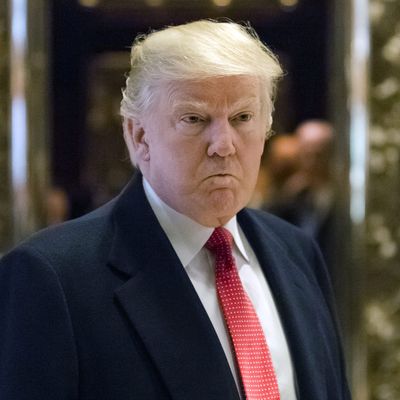
Donald Trump’s government has not yet taken power, but its epitaph may have already been written. The author, Lawrence Kudlow, is a noted voodoo economist and the reported leading candidate to head the administration’s Council of Economic Advisors. In a column touting the brilliance of Trump’s appointments — “Trump’s transition continues to go smoothly. Better than smoothly. Confidently. More than confidently. Transcendently” — and naturally omitting any mention of his own prospective candidacy, Kudlow dismisses any concerns of the conflicts of interest that are already rife. In a National Review column, Kudlow makes the case not only that Trump and his administration are not corrupt, but also that they cannot be corrupt, by virtue of their wealth. “Why shouldn’t the president surround himself with successful people?” reasons Kudlow, “Wealthy folks have no need to steal or engage in corruption.”
In point of fact, it does not take much effort to find wealthy folks who steal and engage in corruption. Look at, oh, imprisoned coal baron Don Blankenship, who indirectly murdered 29 of his employees by blatantly flouting safety regulations and who tried to purchase his state’s legal and political system to protect himself. (Blankenship endorsed Trump.) Or look at Vladimir Putin, a leader whose methods Trump has repeatedly praised and who has leveraged his power into billions of dollars of personal wealth. Or look at Donald Trump himself, who was born into massive wealth, had no need to steal or engage in corruption, yet cheated hundreds of contractors of their money, defrauded thousands through scams, and frequently boasted of his success at corrupting politicians. Clearly, it is not impossible for already-wealthy people to steal and to engage in corruption.
Kudlow’s argument is important not only for its absurdity but for what it reveals about the coming age in Washington. Trump was able to prevail in part by positioning himself to Hillary Clinton’s left on economic issues. Trump won 38 percent of voters who desire more liberal policies than President Obama delivered (and nearly a fifth of white voters without a college degree who approve of Obama’s performance as president). It was Trump’s image as an outsider — a dangerous man, perhaps, but an avowed enemy of “a failed and corrupt political establishment” and “large corporations.”
In reality, Trump’s administration is a rebuke to the very notion that the public interest diverges in any way from private ones. The Labor Department will be run by a man whose interest in the field is dominated by a mania for cheap labor; the Environmental Protection Agency will be run by a virtual pass-through for fossil-fuel interests. Trump’s government will make policy by and for the rich and well-connected. As Politico reports, “the extent to which donors are stocking Trump’s administration is unparalleled in modern presidential history.” As Kudlow makes clear, Trumpism regards the fear that government might favor capital over labor or some other public interest as inherently nonsensical.
What has been exposed is not only the lie at the heart of Trump’s campaign, but a delusion embedded in conservatism itself. Conservatives like to imagine that their policy represents a challenge to the power structure, which they see as “crony capitalism,” a form of corruption threatened by their free-market ideas. The failures of the Bush administration (which, in fact, followed the tax-cutting, deregulatory agenda that conservatives had promised would usher in prosperity) were dismissed as the byproduct of the administration’s departures from market purism. Bush and the Washington Republicans allowed power and wealth to corrupt them, the argument went. As Bush’s popularity plunged, conservatives lacerated their party with polemics like Matthew Continetti’s “The K Street Gang,” which depicted the GOP as a self-enriching elite.
The conceptual distinction between the good kind of wealth, earned through the free market, and the bad kind, earned through political favoritism, is an absolutely vital one for right-wing intellectuals. And yet Trump is showing how easily it collapses in practice. Conservatives have treated a first family using the powers of office to enrich itself — not theoretically or in the future but right now, on an ongoing basis — as, at worst, a distraction or a problem of optics. In practice, conservatives share Kudlow’s belief that a government of and by the rich is necessarily virtuous.
Kudlow touts another pro-Trump column, this one written by Wall Street titan Ray Dalio. In the course of touting Trump’s agenda, Dalio makes the key point that Trump is driven by veneration of the rich and contempt for the poor:
[I]f you haven’t read Ayn Rand lately, I suggest that you do as her books pretty well capture the mindset. This new administration hates weak, unproductive, socialist people and policies, and it admires strong, can-do, profit makers. It wants to, and probably will, shift the environment from one that makes profit makers villains with limited power to one that makes them heroes with significant power.
Again, a strict Randian would draw a distinction between rich people who succeeded through pure capitalism and those who succeeded through political favoritism. But Dalio glides over the distinction, as one must when venerating a government led by the ultimate crony capitalist. Likewise, Continetti has a new column reframing Trump’s differences with (or ignorance of) conservative doctrine as a virtue. “Trump’s relation to the intellectual community of both parties is fraught because his visceral, dispositional conservatism leads him to judgments based on specific details, depending on changing circumstances, relative to who is gaining and who is losing in a given moment,” he writes.
We can be pretty sure that Trump, his family, and his friends will be among the people who gain from his policies. Conservatives appear distinctly unalarmed by the prospect.






























